 In August 2015, Timor-Leste signed a $719 million contract (the largest in the nation's history) with the South Korean companies Hyundai Engineering & Construction and Hyundai Engineering to design and construct a logistics base in Suai for future offshore petroleum operations. The “Suai Supply Base” is basically a harbor, port and warehouses.
In August 2015, Timor-Leste signed a $719 million contract (the largest in the nation's history) with the South Korean companies Hyundai Engineering & Construction and Hyundai Engineering to design and construct a logistics base in Suai for future offshore petroleum operations. The “Suai Supply Base” is basically a harbor, port and warehouses.Hyundai E&C has been sanctioned many times by the Korean Fair Trade Commission – the Korean government organ responsible for investigating and prosecuting corruption cases involving Korean businesses. In 2014, Korea’s Public Procurement Service banned the company from bidding for government contracts for two years.
In October 2015, Timor-Leste’s Chamber of Accounts rejected the Hyundai SSB contract, using its power of prior review under Article 32 of Law No. 9/2011, the Organic Law of the Audit Chamber of the High Administrative Tax and Audit Court, which requires contracts over $500,000 to be pre-approved by the Audit Chamber. La’o Hamutuk appreciates the wisdom and courage of the Audit Chamber and the Court of Appeals, and we hope that other public entities will emulate their integrity and impartiality.
The Government appealed the Audit Chamber decision in November, and the Appeals Court has not yet ruled on the appeal. The process is complicated because the Court of Appeals is also serving as the interim High Tax and Audit Court and there were too few judges available to hear the appeal, especially after the Government fired the Portuguese judges in 2014. On 17 June 2016, the Korea Herald, a Korean newspaper, reported that Hyundai’s patience had run out, and the company had told regulators it decided to ‘scrap’ the Supply Base project.
For the last several years, La’o Hamutuk has urged the Government of Timor-Leste to analyze objectively the potential customers and costs, benefits and risks of the Suai Supply Base. Will the gains for Timor-Leste’s people outweigh the project’s economic cost, social impacts and environmental damage? We have not seen any such analysis – only blind faith, sectoral self-promotion, and personal benefits for project implementers, rather than serious consideration of the public interest.
La’o Hamutuk believes that the Suai Supply base will waste Timor-Leste’s people’s money and disrupt communities, but that the economic development, jobs and taxes it will generate will not be enough to justify the financial, land and human costs. Like the other parts of the Tasi Mane Project, the Suai Supply Base continues our unhealthy dependence on petroleum, ignoring opportunities to develop productive economic sectors.
In addition, Timor-Leste must strengthen its procurement system in order to guarantee that we do not give contracts to corrupt companies who simply wish to exploit Timor-Leste’s wealth for their own benefit. Although Hyundai E&C has already pulled out of this project, La’o Hamutuk urges authorities, perhaps including the Anti-Corruption Commission, to look into the tender process leading to this contract. Timor-Leste leaders have recently signed several contracts for large infrastructure projects without transparency and with dubious procurement processes. To protect the public interest, we encourage investigation to determine whether there were violations of Timor-Leste laws and to see how these critical systems can be strengthened.
Last week, the Council of Ministers approved a mid-year budget rectification and sent it to Parliament for approval. They want to add more spending to the 2016 State Budget to cover this year’s spending on poorly-planned megaprojects, including $150 million for the Suai Supply Base, $130 million for Tibar Port and $24 million for the Dili drainage project (which has also been rejected by the Audit Court). Although not mentioned in the media, another likely reason for the budget adjustment is cost overruns on the first segment of the Suai-Beaçu Highway – the 2016 budget allocates only $20 million, but the Transparency Portal shows that $56.9 million had already been spent by mid-June.
The delays in the Suai Supply Base contract make the budget adjustment unnecessary, as the current 2016 budget (Book 3A) already appropriates $142 million (plus $64 million in loan money) for the Suai Supply Base during 2016 and 2017, and $498 million more in 2018-2020. With no construction contract, this money will not be spent. Without the Suai Supply Base, other Tasi Mane elements including the $93 million Suai airport, $588 million first phase of the Suai-Beaçu Highway, Suai-Betano oil pipeline and Betano Refinery (for which no cost estimate has been released, but which will cost billions of dollars) make no logical sense, and should also be cancelled. This would free up this money for higher-yielding investments like education and health.
Tendering irregularities and Hyundai’s withdrawal from the Suai Supply Base contract have given Timor-Leste an unexpected opportunity to reconsider the decision to buy many components of the Tasi Mane Project. Although these have already cost Timor-Leste more than $100 million and displaced hundreds of people, the impacts to date are tiny compared with the billions of dollars and thousands of evictions which will accompany the Suai and Betano components of the Tasi Mane project, as well as the environmental damage they will cause. It is time to stop throwing good money after bad, and to focus on realistic, achievable pathways for sustainable, equitable development which will provide benefits for all citizens of Timor-Leste, not only for foreign construction companies and TimorGAP.





























